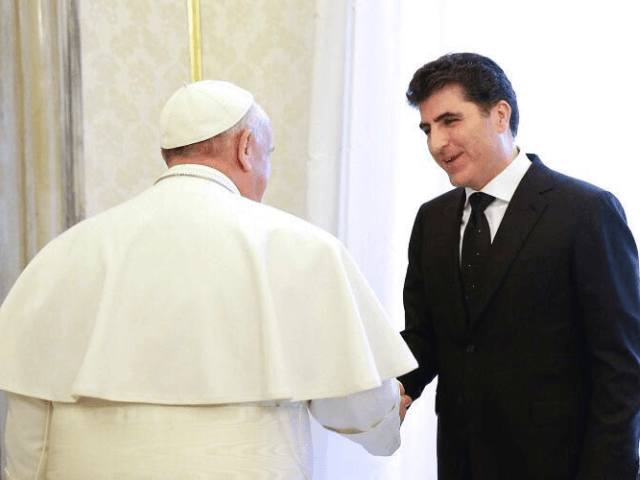Iraq’s Kurdistan Regional Government (KRG) is seeking aid from the Vatican and, reportedly, the normalization of ties to Iran three months after President Donald Trump announced Washington would not “take sides” between its longtime allies, the Kurds, and the Iran-backed regime in Baghdad.
Iran has supported militias that invaded and took over KRG territory in Kirkuk late last year. More recently, the Iranian government claimed that protests against the Islamic dictatorship were a conspiracy planned by American, Kurdish, and Iranian opposition forces.
The Kurdish outlet Rudaw reports that the KRG is seeking a stable relationship with Tehran as it struggles to restore stability following an independence referendum in September and subsequent invasion. Iran-backed terrorist militias—including the Hezbollah brigades and Asa’ib Ahl al-Haq, responsible for thousands of attacks on U.S. troops—invaded Kurdish territory in Kirkuk, posted photos of Supreme Leader Ayatollah Khamenei in government buildings, and triggered an exodus of tens of thousands from the region in October.
Kirkuk is not a traditionally Kurdish area, but fell under Kurdish control when the Iraqi military fled an Islamic State (ISIS) attack in 2014. The Kurds have maintained that, since their Peshmerga kept the city from falling to ISIS, they have proven they are better equipped to run the city.
As the dust settled on the Kirkuk situation, Iran has accused the Kurds of dredging up unrest within its borders. Despite this, the KRG representative in Iran says the government seeks peace with the neighboring country.
“[T]he statement made by [KRG Premier] Nechirvan Barzani assured Iran that the Kurds were not behind the protests,” Nazim Dabagh told Rudaw. The representative, Rudaw notes, “predicts that political relations between Erbil and Tehran will return to normal in due time.”
Last week, Barzani issued a statement calling “for closer relations with the Islamic Republic of Iran” and urging KRG minority parties to support this shift. He also called Iran’s claims that the KRG had triggered widespread protests within Iran “comical.”
“Iran wants to have strong relations with the KRG, although it appears as it’s supporting the Iraqi government more so,” Dabagh suggested. He stated that the KRG’s attempt to build bridges to neighbors that are, at best, wary of its existence is “long overdue.”
Rudaw notes that the KRG had put in little effort to improve ties with Iran before the September referendum, declining invites to then-President Masoud Barzani to visit Tehran on multiple occasions. Barzani, the premier’s uncle, stepped down from his post following the invasion of Kirkuk. Instead, reports from late last year suggest that Iran was the actor making moves towards normalization before protests erupted against the Islamic autocracy. In December, Iran announced it would reopen border crossings with the KRG—closed after the referendum—to allow for more people exchanges and trade.
In addition to seeking closer ties to Iran, Premier Barzani met with Pope Francis at the Vatican last week to discuss cooperation with the KRG. Barzani “asked him to play a role in de-escalating tensions between Erbil and Baghdad,” according to Kurdistan24.
“The Kurdistan Region delegation, led by Prime Minister Barzani, met with Pope Francis to discuss the current situation in the Region, relations between Erbil and Baghdad, Christians’ affairs, and coexistence in Kurdistan,” Chief of Staff to the Kurdistan Region Presidency Fuad Hussein said of the meeting.
Barzani also reportedly spoke to U.S. Secretary of State Rex Tillerson via phone this week, who told the prime minister that Washington would support any operations against the Islamic State, which no longer controls any significant territory in Iraq, and hoped the KRG could be “successful in overcoming the current crisis.”
Tillerson’s affirmation of neutrality to Barzani echoes the policy President Trump announced in October towards the invasion of Kirkuk.
“We don’t like the fact that they’re clashing. We’re not taking sides, but we don’t like the fact that they’re clashing,” Trump told reporters at the time. “Let me tell you, we’ve had for many years [a] very good relationship with the Kurds, as you know, and we’ve also been on the side of Iraq even though we should never have been there in the first place, but we’re not taking sides in that battle.”
Trump did not address reports that the Iran-backed Popular Mobilization Units (PMU/PMF), which led the assault on Kirkuk, were using American weapons to attack American allies. The PMU boasted U.S. weapons provided for use in the fight to liberate Mosul, Iraq’s second-largest city, from the Islamic State.
Hezbollah, among others, took credit for the siege of Kirkuk.
The KRG later announced it would “revise” its ties to the United States following Washington’s arming of militias attacking their territory and lack of support during the siege.
Apparently sensing a willingness to fill the void where the Kurds expected an American presence in the dispute, the Russian government has expressed some willingness to take on a bigger role in Iraq.
“Russia is ready to mediate between Erbil and Baghdad to address their differences,” Foreign Minister Sergei Lavrov told reporters on Monday.
The Russian propaganda site Sputnik also cited an unnamed “source in the KRG” this week who allegedly claimed that “they would like Russia to help solve the crisis diplomatically, by potentially serving as a mediator to facilitate and catalyze bilateral reconciliation negotiations between Iraqi Kurdistan and Baghdad.”
Lavrov—though not Russia officially—supported Kurdistan’s right to hold a referendum on indepedence in September, unlike the United States. Of its neighbors, only Israel stood in support of the KRG’s move.
The referendum, though its results were overwhelmingly pro-independence, was non-binding, and at no point did the Kurds declare independence. Instead, Kurdish officials insisted the referendum was a way to gauge public sentiment and use it to become better neighbors with Iran-controlled Baghdad.

COMMENTS
Please let us know if you're having issues with commenting.